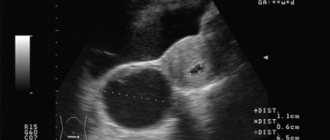Main causes of bloating during pregnancy
Most often, this unpleasant symptom occurs for the following reasons:
1. Insufficient functioning of the pancreas, which cannot cope with its “job”. In addition to bloating, a woman may experience heartburn and diarrhea.
2. Frequent overeating and consumption of difficult-to-digest foods, which trigger fermentation processes in the intestines. This leads to excessive accumulation of gases.
3. The presence of various gastrointestinal diseases in a pregnant woman (pancreatitis, cholecystitis, cirrhosis, cholestasis, ulcer).
4. Enzyme deficiency. Its appearance can be contributed to by diseases of the endocrine system, the presence of inflammation in the intestines, dysbiosis or heart failure.
5. An increase in progesterone (hormone) contributes to a decrease in the tone of all internal organs, which leads to severe bloating and abdominal pain.
6. Insufficient fluid intake (you need to drink at least two liters of water per day).
7. Wearing clothes that are too narrow and tight, which puts pressure on the rounded tummy, thereby causing disturbances in the gastrointestinal tract.
8. Failure to maintain a balanced menu. This includes eating all foods indiscriminately. In fact, this is a big mistake, because during pregnancy a woman must definitely adjust her menu and stop eating junk food.
9. Eating on the run and frequent night meals.
10. Stress and nervous tension can also cause bloating. In addition, the unstable psycho-emotional state of a pregnant woman will negatively affect the development of the fetus, as well as provoke abdominal pain, heartburn, headaches, depression, etc. in the woman.
11. Excessive enlargement of the uterus (this usually happens in the third month of pregnancy).
How are gases formed?
According to James L.A. Rose, Ph.D., author of Gastrointestinal Gas (Chapter 17 in Gastroenterology, Vol. 4, 1976), most people (2/3 of adults) produce gases that do not contain methane. If both parents have gastrointestinal gases containing methane, there is a 95 percent chance that their children will have the same. Scientists have not yet found an exact explanation for this phenomenon. Some believe it's down to genetics, while others say it's due to environmental factors. In any case, they all agree that the methane in gastrointestinal gases does not come from human cells, but from the work of bacteria.
Bloating during pregnancy: risks and consequences
During the period of bearing a child, a woman’s body is subjected to enormous stress, so it is very important that during pregnancy the fetus is protected as much as possible. Unfortunately, with flatulence, the unborn child suffers for the following reasons:
When a woman is bloated, she tries to eat less so as not to cause gas, but this leads to a lack of nutrients for the fetus;
Strong rumbling in the stomach causes discomfort not only for the pregnant woman, but also for the unborn baby.
The consequences of untreated flatulence can be:
1. Miscarriage or premature birth, which occurs due to decreased tone of the uterus (gases will provoke this, because they will distend the intestines).
2. The birth of a child with psychological disorders or other pathologies can happen if a woman experiences stress during flatulence.
3. The birth of a weak child who did not receive the required amount of nutrients during development.
How to solve a problem
Gas in the abdomen during pregnancy is almost impossible to eliminate without diet adjustments. Therefore, you definitely need to consult a gastroenterologist and create a therapeutic diet. It should be as varied and complete as possible, but at the same time gentle. All foods that irritate the mucous membranes are excluded. Conversely, you need to consume the maximum amount of natural fermented milk products, which promote the growth of beneficial microflora. Eliminate sweets, coffee, spicy foods. Then digestion will always be normal.
Causes of gas formation during pregnancy
Increased gas formation during pregnancy is caused by the accumulation of gases in the intestines.
A concomitant factor is a heavy feeling and fullness in the abdominal area. In this case, the pregnant woman may feel a kind of colic, minor pain due to the movement of gaseous substances. It is not uncommon for flatulence to be accompanied by belching or rumbling from the intestines. It is extremely rare that gas in pregnant women is accompanied by indigestion or, conversely, constipation. Also, flatulence, if the symptoms are due to pregnancy, is not a constant phenomenon. Signs appear with some frequency depending on the presence of provoking factors.
During pregnancy, gases occur primarily due to the active production of progesterone, which reduces the contraction of the uterine cavity, and at the same time, gastrointestinal motility decreases. As a result, the movement of food through the intestines slows down, which causes fermentation and the accumulation of gases.
There are other causes of flatulence during pregnancy:
- decreased production of pancreatic enzymes in the early stages;
- enlargement of the uterus in later stages puts pressure on the digestive organs;
- the presence and exacerbation of chronic diseases associated with the gastrointestinal tract;
- lack of movement or sedentary professional activity;
- poor nutrition during pregnancy;
- drug therapy with the prescription of drugs that cause bloating.
If you experience gas during pregnancy in the second or third trimester, then most often this indicates physiological factors.
At this stage, flatulence can also be caused by tight clothing, various stresses or dehydration. During pregnancy, symptoms appear with renewed vigor if, before the delay, increased gas formation was observed due to hormonal surges. Moreover, already in the first trimester, a successful conception can be suspected based on the presence of gases in a pregnant woman.
How to get rid of gas during pregnancy?
Already in the second trimester, gas formation increases significantly due to the increased load on the female body, which is considered a normal physiological manifestation.
It is not possible to completely get rid of gas formation during pregnancy, but there are ways to reduce the factors that provoke bloating. Treatment of flatulence in the first three months should be accompanied by consultation with a doctor, since during this period, as a result of independent and unprofessional actions, harm can be caused to an immature fetus.
- massage with stroking the abdomen in a clockwise direction;
- moderate physical exercise is encouraged (yoga, fitness, swimming);
- Long daily walks in parks with plenty of green spaces will saturate the body with oxygen.
Such simple actions help in cases even if severe gas formation is observed.
In some situations, when a woman has constipation, the opposite situation may occur, with complaints that gases cannot be passed out during pregnancy. With this diagnosis, doctors always advise adhering to a special diet that will help normalize gas discharge. Products that increase gas formation in the intestines during pregnancy:
- cabbage;
- radish;
- apple and grape juice;
- milk;
- carbonated drinks;
- bean dishes;
- eggs;
- yeast baked goods.
Additionally, you should avoid dishes prepared using the hot method, as well as canned and spicy foods.
Any sweet baked goods provoke gas formation during pregnancy, so these dishes should be excluded. The diet should consist of fermented milk products, including cottage cheese; a variety of salads seasoned with vegetable oil and dried fruits are recommended. In this case, the daily diet should be divided into 4-5 doses in order to reduce the load on the digestive tract.
If gases do not pass away, then you can use traditional methods, which include decoctions of dill, parsley, mint or fennel. You should also remember to drink fluids to avoid dehydration.
Pregnancy is an unforgettable period in the life of any woman. However, it can be accompanied by many unpleasant moments, including increased gas formation or gases (flatulence). Gas can bother even those women who never had digestive problems before pregnancy. Gases do not pose any danger to the unborn baby, but they cause a lot of inconvenience to his expectant mother.
Gas is accompanied by bloating, belching, rumbling and a feeling of fullness. Increased gas formation in some cases can be combined with painful sensations in the lower abdomen, up to the appearance of gas colic. In rare cases, flatulence can provoke a threat of termination of pregnancy. As a rule, gases occur in the second and third trimesters of pregnancy, when the uterus reaches a significant size.
There are many reasons for the appearance of gas during pregnancy. First of all, they are caused by the hormonal background of the pregnant woman, that is, a large amount of progesterone in the blood relaxes all the smooth muscles in the body, including the intestines. Plus, in the second trimester of pregnancy, there is pressure on the intestines from the growing uterus and disruption of its location. All this provokes increased gas formation in the intestines, disrupts its emptying, and leads to decreased peristalsis. We should not forget that many expectant mothers (to be honest) allow themselves disordered, unbalanced and plentiful nutrition, which together results in a serious problem. Other causes of gas during pregnancy include dysbacteriosis, diseases of the gastrointestinal tract, as well as a lack of enzymes, which allows undigested food to enter the large intestine in large quantities, where the processes of fermentation and putrefaction occur.
Of course, it is impossible to somehow influence hormonal levels or the physiological movement of the intestines, but the problem of gases during pregnancy associated with nutrition can be solved by following a certain diet. But before this, you should definitely consult with a therapist in order to exclude the presence of abnormalities or pathologies of the gastrointestinal tract (ulcers, diseases of the pancreas, intestines, liver). If any intestinal diseases are detected, treatment is prescribed and carried out depending on the duration of pregnancy. If the cause of gas formation is pregnancy itself, it is recommended to solve this problem with the help of diet.
The diet for eliminating gas during pregnancy is not particularly different from any other diet. The diet should be varied and balanced to ensure that the baby and mother receive the necessary nutrients. Meals during the day should be from five to seven small portions, which eliminates the possibility of overeating. In addition, it is important to exclude from your diet foods that cause increased gas formation. Among them are legumes, apples, bananas, grapes, cabbage in any form, corn, rye bread, sweets, carbonated drinks, oatmeal and other grain products, onions, turnips, as well as fried foods, pickles and marinades. Eat more foods such as fermented baked milk, yogurt and kefir, as they prevent the formation of gases. This also includes eating cottage cheese, which is rich in calcium, which is very important during pregnancy, and also eliminates the possibility of gas formation.
Other ways to combat gases during pregnancy can be: daily prolonged stay in the fresh air, swimming in the pool (effectively stimulates intestinal activity), daily special exercises for the intestines, which consists of stroking the abdomen clockwise while lying on your side for ten days. fifteen minutes, after which you need to turn on your left side, raise your leg and release gas.
An excellent remedy for gas relief during pregnancy are decoctions of dill seeds, parsley, fennel, dandelion root and valerian. To prepare a decoction, take one tablespoon of roots or leaves or a teaspoon of seeds of one of the above herbs and pour boiling water (200 ml), cover and leave for four to five hours. The resulting decoction should be taken three times a day an hour before meals. It is also safe to take carminative medications such as espumizan and simethicone. Chamomile tea can also be an excellent help in the fight against increased gas formation, but you should drink it weakly and no more than two cups per day.
To make pregnancy a joyful period, not overshadowed by unpleasant sensations, take care of yourself, take care of yourself and lead a healthy lifestyle, and our tips will help you with this.
Increased formation of gases in the intestines (flatulence) is a serious problem that can significantly disrupt the usual course of life. During pregnancy, this condition occurs mainly in the later stages, but excess gas formation is possible in the first trimester. This symptom is not dangerous for the development of the fetus, although it indicates problems in the digestive tract. In rare cases, excessive discharge of gases indicates a serious disorder that threatens the course of pregnancy.
How to cope with an unpleasant syndrome
To cope with bloating, you should definitely undergo an examination that will help you find out the exact causes of excess gas formation. A competent diagnosis will help to accurately determine whether bloating is simply a side reaction of the body to an interesting position or whether the reasons lie in pathological factors. Based on the results of the examination, the doctor will be able to give the most effective recommendations and make the necessary appointments.
Before taking any medications, be sure to talk to your doctor.
What to do if you have flatulence? Therapy for increased gas formation should be carried out with medications that do not pose any threat to the pregnant woman and the fetus. Adjustments in the diet and folk remedies will also help cope with bloating. To get rid of unpleasant discomfort in the intestines, you should drink enough liquid, eat small portions and lead a healthy and fairly active lifestyle.
Medicines
If your stomach is very bloated from terrible flatulence, then some medications that are not contraindicated for pregnant women will help cope with the problem. You cannot take them on your own; such prescriptions should only be made by a specialist after appropriate diagnosis. The most effective in this clinical situation are carminative medications, after taking which the patient begins to feel clear relief, the intestines immediately relax, and the spasms disappear. Simethicone is considered the safest carminative for pregnant women. This drug is produced in the form of drops, and take 25-30 drops immediately after meals. The medication is also suitable for treating infants.
Espumisan is also considered a safe remedy for expectant mothers. These little yellow capsules are safe even for babies. They quickly and painlessly relieve signs of flatulence. You need to take two capsules of the drug, preferably before bed. When treating with Espumisan, the drinking regime should be increased, otherwise there is a risk of developing long-term defecation delays. The components of the capsules are not absorbed into the bloodstream, and therefore have no effect on the embryo. A rapid therapeutic effect occurs due to the formation of a protective film on the intestinal walls.
Iberogast is also considered an approved drug for the treatment of flatulence in women expecting a child. This remedy is entirely of plant origin and contains milk thistle and licorice, chamomile and bitter Iberian, peppermint and caraway, and medicinal angelica. The drug has a selective therapeutic effect on intestinal structures, since it increases muscle tone in those parts of the intestine where this action is necessary, and where tension is too high, Iberogast, on the contrary, relaxes the muscles. The drug is also used for irritable bowel or bowel retention.
Medicines such as activated carbon, Bifidumbacterin, Hilaka forte or Ecoflora, etc. are also used for increased gas formation. These medications are not prohibited for pregnant women, and if taken correctly they will not cause any side effects or unexpected reactions.
Folk remedies
There are many herbal remedies, various mixtures and decoctions that can help with severe flatulence.
- Chamomile decoction. Boil a large spoonful of dried inflorescences in a glass of water for about 5 minutes. Then pour the mixture into a thermos and leave for 3-4 hours. The finished product is filtered and drunk two large spoons four times a day, about a quarter of an hour before meals.
- Dill water. This remedy is often used for gas in infants. To prepare healing water, you need to brew a large spoon of dill seeds with 300 ml of boiling water. The infusion is kept covered, wrapped in a towel, for 3 hours. The finished medicine is filtered and drunk 60 minutes before meals, half a glass.
- It is also useful to eat fresh dill, which is added to salads and first courses.
- Gas formation will be noticeably reduced by consuming a special mixture of ginger and lemon juice. Five grams of ginger powder are mixed with a large spoon of freshly squeezed lemon juice, then sprinkled with a pinch of salt. It is recommended to take the product before main meals for a two-week course.
For dysbacteriosis, doctors strongly recommend drinking kefir, which inhibits the development of pathogenic microorganisms in the intestine. If flatulence is acute and accompanied by severe spasms, then it is recommended to lie down and relax, stroking your stomach in the direction of the clock hand. This massage should be done for about a quarter of an hour. After eating, you should definitely take a walk and it is absolutely unacceptable to lie down right away, since the horizontal position of the body on a full stomach only favors bloating.
Nutritional Features
A pregnant woman should pay special attention to her own diet. All products that can provoke intestinal fermentation processes should be excluded from it. These include yeast baked goods and full-fat milk, cabbage and coffee, apples and candies, various types of legumes, most vegetables, nuts and full-fat milk.
Low-fat kefir is a great choice
A pregnant woman's diet should consist mainly of cereals, lean fish or meat. In order for the intestines to function without interruption, you should regularly eat fermented baked milk or kefir, yogurt or snowball. Bananas, prunes and pumpkins are also useful for intestinal activity. You need to eat little by little, up to 5-7 times a day.
Physiological causes of increased gas formation
From the first weeks of pregnancy, increased production of progesterone begins in the body of the expectant mother. The main task of this hormone is to reduce the tone of the uterus and prevent fetal rejection. The influence of progesterone extends not only to the pelvic organs. Affects the hormone and other structures, including the intestines. Muscle tone decreases, which leads to its relaxation. The passage of food through the intestines slows down, it stagnates in the lumen of the colon. Against this background, flatulence develops as a result of the natural influence of progesterone.
Almost all pregnant women suffer from excessive gas production. It is rare that any expectant mother manages to avoid the appearance of unpleasant symptoms. This condition is not dangerous for the child, but causes considerable discomfort to the woman. As the fetus grows, the symptoms increase, and the condition of the expectant mother worsens. All unpleasant manifestations go away on their own after childbirth. In most cases, no special treatment is required.
In the second half of pregnancy, flatulence is associated not only with the influence of progesterone, but also with other factors:
- decreased production of pancreatic enzymes and impaired digestion of food;
- increased putrefactive processes in the intestines;
- pressure of the growing uterus on the intestinal loops and slowing down their activity.
This explains the fact that usually increased gas production is noticed by a woman after 16-20 weeks. In the early stages, such symptoms occur less frequently and are not so pronounced.
Bloating and gas formation also appear when there is an error in diet. Sweets, baked goods, some fruits, vegetables and other foods provoke flatulence. Gas formation is observed when drinking strong tea and coffee, kvass, beer and other alcoholic beverages. The condition improves after normalization of nutrition.
When looking for the causes of excess gas, it is important to consider some points:
- A pregnant woman's addiction to unusual foods, sudden changes in diet and overeating lead to a slowdown in the movement of food through the intestines, increased putrefactive processes and the appearance of gases.
- A sedentary lifestyle, especially in the second half of gestation, interferes with the normal functioning of the digestive tract, leading to constipation and flatulence.
- During pregnancy, many women suffer from edema, and fluid restriction is often practiced to eliminate it. This tactic does not allow one to cope with edematous syndrome, but it leads to intestinal obstruction and increased gas formation.
If unpleasant symptoms persist after the birth of the baby, you should consult a doctor. In some cases, increased gas formation indicates diseases of the digestive tract.
Gases. sorry, with a pungent smell of rotten eggs. A sign of what?
I apologize for such a piquant question. I regularly pass gas during the day (3-4 times a day), and the gas smells of the acrid and stinking smell of hydrogen sulfide (rotten eggs). What could this symptom indicate? There's nothing else to worry about.
Three or four times is not much. Normally, the body produces about three liters per day. And many people pass gas much more often. An increase in the formation of gases above the norm - flatulence - only consult a doctor with this question.
In your case, you need to analyze the menu. Eating cabbage or meat, if they are poorly digested, can lead to the appearance of such a smell. Especially fatty meat.
In general, I recently read that gases with the smell of hydrogen sulfide can benefit the body. Small amounts of this odorous gas protect the cells. So a smelly fart will help in the prevention of stroke, dementia, arthritis and a number of other diseases (these are the results of the research).
Eliminate gas-forming foods from the menu for a while and if the smell does not change, then you need to check the large intestine for poor functioning.
Normally, intestinal gases are hydrogen sulfide. A more intense smell may be due to the banal consumption of a larger than usual amount of proteins, such as meat and legumes.
If you have been tormented by gas for one or two days, most likely you have eaten too much pea porridge, salad with the presence of brain peas, chicken eggs or sauerkraut.
if the baby is born at 36 weeks of pregnancy The whole family is waiting, because it’s already 36 weeks of pregnancy! You've already packed your bag for the maternity hospital, completed training courses, and you're fully prepared. All that remains is to enjoy the last month of pregnancy and read books for expectant mothers.
ABOUT
The average person releases approximately 500 to 1,500 milliliters of gas through the rectum every day. This gas typically consists of nitrogen, oxygen, carbon dioxide, hydrogen and methane. These gases are known to be odorless. An unpleasant odor may occur if other gases, as well as sulfates, are added. This happens in two cases. Firstly, if the gas remains
Source
Pathological causes of gas formation in the intestines
It is impossible to consider all diseases accompanied by gas formation, but it is important to know the symptoms of the most common conditions. In most cases, flatulence and bloating are not the main signs of pathology, but occur against the background of other characteristic manifestations.
Flatulence in pregnant women can also be caused by neurosis or appear after stress.
The formation of gases often occurs while taking various medications. During pregnancy, special attention should be paid to iron supplements for anemia - they are the ones that most often cause the problem.
Clinical picture
Gas formation in the intestines does not occur in isolation. This condition is almost always accompanied by other unpleasant symptoms:
- bloating;
- heaviness in the epigastric region;
- stabbing pain around the navel, lower abdomen and in its lateral parts;
- heartburn;
- nausea;
- belching air;
- bitter taste in the mouth;
- decreased appetite;
- diarrhea or constipation;
- sleep disturbance.
As the fetus grows, the symptoms only intensify. In the later stages, cramping pain may appear caused by the accumulation of gases in the intestines. The provoking factor of flatulence is a violation of the diet, low physical activity or stress.
Treatment of flatulence
During pregnancy, the following methods are used:
Diet
Normalizing your diet is the first thing to do when gases form. Following a diet helps improve the condition and sometimes allows you to do without drug intervention.
General principles:
- frequent split meals;
- reducing the volume of portions;
- chewing food thoroughly;
- prevention of hunger – timely snacks;
- adherence to a meal schedule;
- drinking enough fluid (1.5-2 liters per day).
Products that increase gas formation are excluded from the diet:
- sweets;
- baked goods;
- bread made from premium flour;
- vegetables (cabbage);
- fruits (apples, grapes);
- legumes (beans, peas);
- dairy products;
- semolina;
- eggs;
- soups with strong meat and fish broths;
- fatty meats and fish;
- prepared sausages, smoked meats, semi-finished products, canned food;
- sauces: mayonnaise, ketchup;
- spicy seasonings;
- drinks (black tea, coffee, kvass, beer).
The daily menu may contain the following products:
- boiled low-fat meats and fish;
- soups made from vegetables and secondary meat broth;
- wholemeal bread;
- unhealthy baked goods;
- porridge (buckwheat, rice, oatmeal, wheat);
- dairy products;
- boiled vegetables and herbs;
- fruits and berries in their natural form;
- vegetable oils;
- drinks (weak tea, compote, jelly, fruit juice).
Physical exercise
- yoga for pregnant women;
- Pilates without stress on the abdominal muscles;
- swimming;
- water aerobics for pregnant women;
- physiotherapy;
- walking.
The training regimen must be agreed with your doctor. For some complications of pregnancy, physical activity is contraindicated.
Drug treatment
To eliminate flatulence, the following means are used:
- drugs that reduce the formation of gases in the intestines (including herbal ones);
- adsorbents for removing toxins;
- enzyme preparations that improve the digestion of food in the intestines;
- probiotics to normalize the microflora of the gastrointestinal tract;
- laxatives for concomitant constipation.
The selection of medications is carried out by a doctor, taking into account the duration of pregnancy and the severity of the woman’s condition. With the right therapy, flatulence disappears, bloating disappears, and other associated symptoms go away.
Prevention
- Balanced diet. It is not recommended to overeat or eat less than 2 hours before bedtime.
- Exclusion of gas-forming foods from the diet.
- Adequate drinking regime.
- Physical activity throughout pregnancy.
- Timely treatment of diseases of the digestive tract.
- Limiting stress.
- A full night's sleep, rest during the day.
The appearance of gases is not a problem that should be kept silent about. If you let the situation take its course, the woman’s condition will only worsen. It is important to eliminate provoking factors in a timely manner to avoid the development of complications. When the first signs of flatulence appear, you should consult a doctor - gynecologist or therapist.
The topic of increased gas formation during pregnancy (however, not only during pregnancy), despite its relevance, is, to say the least, uncomfortable. This becomes the cause of a huge problem, because many women are simply embarrassed to tell their doctor about it, not to mention their family and friends. But in vain. Firstly, because this condition is by no means harmless. And, secondly, because a woman who is carrying a baby under her heart and suffering from increased gas formation can be helped.
The fact that during pregnancy every woman’s body is rebuilt (every organ and every system “works” to ensure the normal development of the baby) is a well-known fact. But sometimes, because of these changes, problems arise that the expectant mother did not even suspect about. This is especially true for such a delicate issue as increased gas formation in the intestines. And, despite the fact that many are in no hurry to talk about their problems in this area, statistics say that 75% of pregnant women face them. At the same time, the issue remains relevant for completely different periods.
Increased gas formation during pregnancy is characterized (in other words, by flatulence), rumbling, and the release of gases. Also symptoms of increased gas formation during pregnancy are an increase in abdominal circumference and a feeling of fullness. In such a situation, a woman’s health worsens. All these phenomena are in most cases accompanied by pain along the intestine. But it also causes enormous psychological discomfort.
It has been established that gas retention reflexively provokes various manifestations. These include increased pain and shortness of breath. In addition, seemingly completely unrelated conditions arise - nausea, an unpleasant taste in the mouth, lack of appetite - which does not have the best effect on the emotional state of the expectant mother. And stress is known to further aggravate these symptoms.
It is reassuring that gas formation is not a disease. This is a natural physiological process that occurs in the human body every day. Pregnancy, a special physiological state of the female body, becomes a period when gas formation increases for a number of reasons. All this leads to functional disorders of the digestive system. In order to know how to help a pregnant woman cope with this unpleasant phenomenon, you need to be aware of the causes of its occurrence.
Why is bloating dangerous?
Although such a problem as increased gas formation seems frivolous, such a pathological condition can greatly harm the fetus and the pregnant woman herself.
- When feeling unwell and the discomfort that accompanies flatulence, the patient begins to experience irritation and excessive anxiety, she is nervous, sleeps poorly, suffers from spastic pain, etc. This state of a pregnant woman negatively affects the well-being of the fetus.
- With severe flatulence, other problems with the gastrointestinal tract develop, and the diet is completely disrupted. After all, the patient refuses to eat or eats very little, thereby depriving the baby of much-needed micronutrients for full development and growth.
- But the most terrible threat is that excessive gas formation can provoke miscarriage or premature birth. It’s just that against the background of flatulence, uterine tone increases due to the strong pressure of the intestines, which is bursting with gases.
Therefore, if bloating occurs in a pregnant woman, it is necessary to urgently take measures to eliminate this problem. To do this, you should contact an appropriate specialist.
What are the causes of gas formation during pregnancy?
So, almost every woman knows that, starting from the very first weeks of pregnancy, a global hormonal change occurs in her body. First of all, the level of progesterone in the blood increases. This hormone relaxes smooth muscles, which is essential for maintaining pregnancy. Otherwise, the resulting contractions of the uterus can cause a miscarriage. Therefore, wise nature made sure that the muscles of the female reproductive organ were in a relaxed state for the time being during pregnancy. However, as everywhere else, there is a “but” in this issue. Progesterone relaxes not only the muscle fibers of the uterus. It causes the muscles of other internal organs to relax. Therefore, the muscles of the intestinal walls also weaken. This, in turn, causes food to pass through the intestines much more slowly than usual, causing it to stagnate and increase gas production. The reason for the accumulation of large amounts of gas during pregnancy is also the growing fetus. As a result, the uterus also enlarges, and significant mechanical pressure is exerted on the intestines. This situation causes not only increased gas formation during pregnancy, but also constipation. It is especially difficult for women who have been diagnosed with chronic intestinal diseases and dysbiosis. During dysbacteriosis, a dominance of pathogenic microflora is observed in the intestines of a pregnant woman, which contributes to the decomposition of food and, as a result, increased separation of gases.
Another reason for increased gas formation during pregnancy is a sedentary lifestyle. Some women move little and do not lead an active lifestyle because they are inherently lazy. Others - due to the threat of spontaneous abortion or.
Nutritional culture and compliance (or non-compliance) with diet also play an important role. If you eat rarely (1-2 times a day) and in large portions, you won’t have any problems. Especially if a woman consumes large quantities of brown bread, legumes, large amounts of raw vegetables, grape and apple juices. Separately, it is necessary to mention carbonated drinks. Firstly, this is a direct path to increased gas formation, and, secondly, this is a very dangerous product for pregnant women. This is relevant for both early and late stages of pregnancy.
Increased gas production is also possible as a result of taking certain medications. For example, iron supplements for anemia, as well as medications that lower blood pressure, affect intestinal function.
Sometimes increased gas formation signals the presence of a pathology that requires thorough, and in certain cases, even surgical treatment. That is why you should not hide the presence of this problem from your doctor. After all, sometimes it is necessary to take urgent measures.
Diagnosis of increased gas formation during pregnancy
One of the most common methods for diagnosing this condition is an ultrasound examination of the abdominal organs. In some cases, colonoscopy is used. This is necessary if feces are often accompanied by bleeding, which may indicate organic damage to the intestines. Also, if there is a suspicion that a woman has increased secretion of progesterone, it is necessary to determine its level. If suspicions are confirmed, take the necessary measures.










